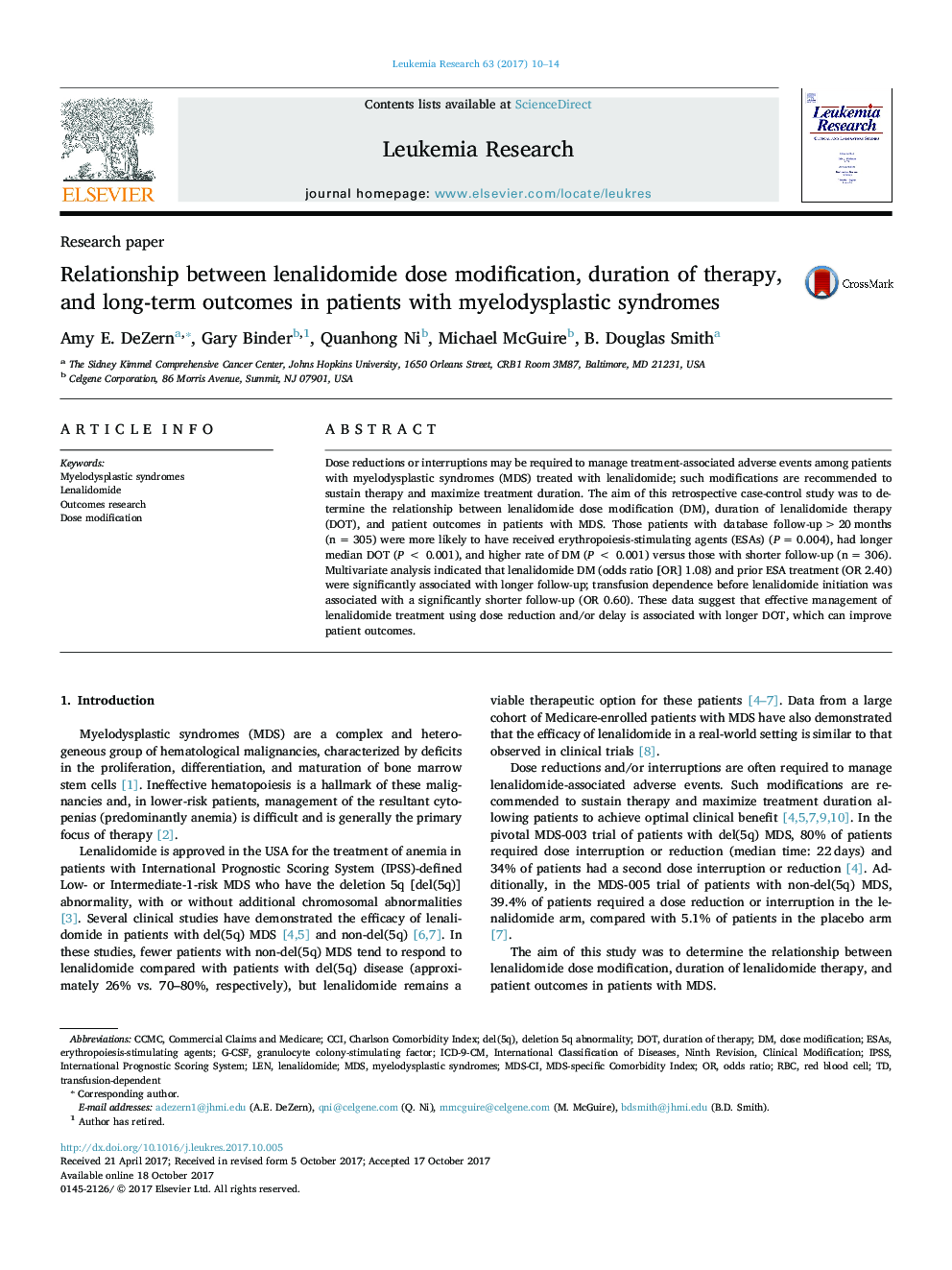| کد مقاله | کد نشریه | سال انتشار | مقاله انگلیسی | نسخه تمام متن |
|---|---|---|---|---|
| 8453412 | 1547884 | 2017 | 5 صفحه PDF | دانلود رایگان |
عنوان انگلیسی مقاله ISI
Relationship between lenalidomide dose modification, duration of therapy, and long-term outcomes in patients with myelodysplastic syndromes
ترجمه فارسی عنوان
ارتباط بین اصلاح دوز لنالیدومید، مدت زمان درمان و نتایج بلند مدت در بیماران مبتلا به سندرم های میلولد پلاسمی
دانلود مقاله + سفارش ترجمه
دانلود مقاله ISI انگلیسی
رایگان برای ایرانیان
کلمات کلیدی
CCMCtransfusion-dependentdel(5q)ESASIPSSCCIICD-9-CMMDSRBCDose modification - اصلاح دزLEN - تنهاMyelodysplastic syndromes - سندرم های میلوسپلاستیInternational Prognostic Scoring System - سیستم امتیاز دهی بین المللی بین المللیCharlson Comorbidity Index - شاخص همجواری چارلزونinternational classification of diseases, ninth revision, clinical modification - طبقه بندی بین المللی بیماری ها، اصلاح نهم، اصلاح بالینیErythropoiesis-stimulating agents - عوامل تحریک کننده ی erythropoiesisgranulocyte colony-stimulating factor - فاکتور تحریک کننده کلنی گرانولوسیتG-CSF - فاکتور محرک کُلونی گرانولوسیتLenalidomide - لنالیدومیدDuration of therapy - مدت درمانOutcomes research - نتایج پژوهشodds ratio - نسبت شانس هاDOT - نقطهred blood cell - گلبول قرمز، اریتروسیت
موضوعات مرتبط
علوم زیستی و بیوفناوری
بیوشیمی، ژنتیک و زیست شناسی مولکولی
تحقیقات سرطان
چکیده انگلیسی
Dose reductions or interruptions may be required to manage treatment-associated adverse events among patients with myelodysplastic syndromes (MDS) treated with lenalidomide; such modifications are recommended to sustain therapy and maximize treatment duration. The aim of this retrospective case-control study was to determine the relationship between lenalidomide dose modification (DM), duration of lenalidomide therapy (DOT), and patient outcomes in patients with MDS. Those patients with database follow-up >20 months (n = 305) were more likely to have received erythropoiesis-stimulating agents (ESAs) (P = 0.004), had longer median DOT (P < 0.001), and higher rate of DM (P < 0.001) versus those with shorter follow-up (n = 306). Multivariate analysis indicated that lenalidomide DM (odds ratio [OR] 1.08) and prior ESA treatment (OR 2.40) were significantly associated with longer follow-up; transfusion dependence before lenalidomide initiation was associated with a significantly shorter follow-up (OR 0.60). These data suggest that effective management of lenalidomide treatment using dose reduction and/or delay is associated with longer DOT, which can improve patient outcomes.
ناشر
Database: Elsevier - ScienceDirect (ساینس دایرکت)
Journal: Leukemia Research - Volume 63, December 2017, Pages 10-14
Journal: Leukemia Research - Volume 63, December 2017, Pages 10-14
نویسندگان
Amy E. DeZern, Gary Binder, Quanhong Ni, Michael McGuire, B. Douglas Smith,
